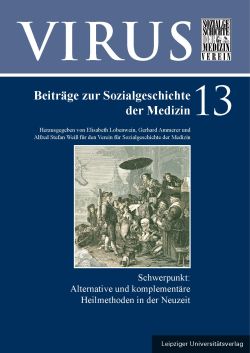
VIRUS Band 13, pp. 133-143, 2020/07/23
Schwerpunkt: Alternative und komplementäre Heilmethoden in der Neuzeit

Complementary healers had been key figures in debates over sexual emancipation in Germany between 1880 and 1930, but today sexology seems to be out of scope for naturopaths or homeopaths. For several decades, concepts of complementary medicine were considered to be a kind of “soft medicine” instead of surgical therapies in academic medicine. Moreover, complementary healers were important members of the “Living Reform Movement” in Germany. But when pharmaceutical trusts, medical bureaucracy and doctors introduced new therapies and laws, naturopaths lost the right to heal “sexual” illnesses.
Keywords: Complementary medicine, sexual emancipation, syphilis, neurasthenia